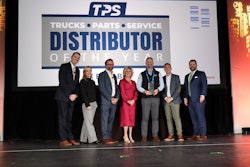When it was announced earlier this month that the Federal Motor Carrier Safety Administration’s proposed rule regarding electronic logging devices (ELD) had been finalized and approved, most of the trucking industry’s initial reaction leaned toward implementation.
Under the guidelines outlined in the new rule, Truck Parts & Service’s sister publication Overdrive wrote drivers using an e-log device will no longer be required to maintain paper logs “but will be required maintain supporting documentation and submit them to their carrier or, for owner-operators, keep them on file.”
Set for a Dec. 16, 2017, rollout date—two years from last week’s official rule publication—FMCSA claims the ELD mandate will save the trucking industry nearly a $1 billion a year from time and money savings due to less paperwork.
But while the mandate is expansive it is not all-encompassing. FMCSA says the mandate has exemptions for drivers who keep records of duty status in 8 or fewer days out of every 30 working days, drivers in drive-away and tow-away operations, and truckers operating vehicles older than model year 2000.
The latter sounds like good news for the aftermarket.
In spite of FMCSA’s $1 billion suggested savings, few small fleets and owner-operators on the road today are fans of electronic logs. Most actively detest them.
Their reasons for such distaste are commonly rooted in two areas: cost and perceived legality.
The first is pretty straightforward. The cost of retrofitting a heavy-duty truck (model year notwithstanding) with the necessary equipment to operate an ELD can be costly, as well as lost business from the downtime of adding the technology. For owner-operators who operating on fixed service budgets with little cash to spare, those costs can be crippling.
And believe it or not, the Federal government agrees.
FMCSA’s decision to exclude pre-2000 model year trucks from its upcoming ELD mandate is directly linked to the cost it would take those vehicle owners (commonly small fleets and owner-operators) to add the tools to their units. The organization estimates costs to vehicle owners could range from a few hundred dollars to a grand or more, with additional expenses of at least $150 per year to use the e-log devices.
“The Agency believes that imposing a requirement for ELDs on pre-model year 2000 vehicles is not feasible in all cases and that trying to distinguish when it is a viable option is too difficult in this rulemaking and next to impossible at the roadside,” FMCSA says.
But while cost may be what eliminates owner-operators from being forced into electronic logs, it is their second grievance that more aggressively irritates them.
A narrative exists in trucking that drivers prefer paper logs because they can be fudged, or unlawfully altered to meet Hours-of-Service requirements. As you’d expect, drivers don’t take such allegations lightly.
Truckers from across the nation were vocal in their condemnation of the narrative on Overdrive’s website last week, offering candid and pointed comments on how such perception does not equal reality.
Wrote one driver, “I’ve been a trucker for over 22 years … Perhaps the biggest insult I always hear from the e-log advocates really has to do with the premise of ‘not cheating’ or ‘level playing field.’ Both of those pretexts make the assumption that the vast majority of us are somehow cheaters, or we somehow aren’t to be trusted.”
Drivers’ aversion to e-logs also are at least tangentially rooted to the complexity of such systems.
As other commenters told Overdrive in the same piece, there are a lot of veteran drivers who get along fine with paper logs and see no reason to change.
If all of this is true—and from what I see in the comments of Overdrive’s various ELD articles I have no reason to believe it isn’t—there are thousands of drivers across North America that are officially committing themselves to a rapidly aging fleet.
They are committing to be your customers.
Combine these drivers with the masses of truckers and fleets spurning newer model units to avoid the costly technology required by EPA Phase I and proposed Phase II emission standards, and it appears a safe bet North America’s heavy-duty vehicle population age is about to spike considerably.
We’re already hovering around an average of 8.5 years. Could a 9.5- or even 10-year average be far away?
I guess we’ll find out in 2017.
In the meantime, I’d start researching ELD manufacturers and add a few lines into your inventory. Not every driver is going to start driving an antique. And if they’re required to buy an ELD in the next 730 days, they might as well buy it from you.











